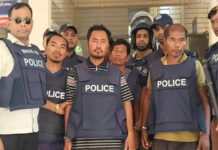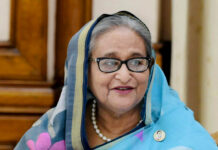The Indian authority decided to review the verdict
Nurul Islam once again broke down in tears before the same Indian court yesterday, asking for justice for his minor daughter Felani Khatun who had been shot to death by a soldier of the Indian Border Security Force (BSF) in January 2011.
“I have no complaint against India, I have no complaint against the BSF…I only want justice – I only want punishment to the person who killed my innocent daughter,” Felani’s father said crying before the court at the end of his statement.
The Dhaka Tribune talked to Nurul Islam and SM Abraham Lincoln, the lawyer Bangladesh government has appointed to assist Felani’s father, over phone about yesterday’s court proceedings on their way back after appearing in the Indian court that sat to review its previous verdict in the Felani murder case.
The seven-member court comprising BSF officials sat at 181 BSF Battalion headquarters in Cooch Behar district of West Bengal conducted the hearing to review the acquittal of BSF Constable Amiya Ghosh from the charge of killing Felani.
The verdict of the Indian court delivered in September last year was heart-breaking for Nurul and other family members and also for the Bangladesh authorities and the people of the country.
Justice-seekers demanded retrial. The Indian authority decided to review the verdict.
Nurul and his daughter Felani were returning to their home in Kolonitari village of Nageshwari upazila in Kurigram from Delhi through the Indian state of West Bengal. During their illegal crossing through Anantapur border area at Fulbari upazial, Kurigram, on January 7, 2011 the BSF shot dead Nurul’s daughter.
Felani’s body had hung from the barbed-wire fence at the border for five hours before the Indians took her body down. They tied her hands and feet to a bamboo pole and carried her away.
The Indian authorities handed over Felani’s body on January 8, 2011 and she was buried in the yard at home, which is two and a half kilometres from the spot where she was shot dead.
Felani’s wedding was supposed to take place in a couple of days after their return to home.
West Bengal media fist published the sensational picture of Felani’s body hanging on the barbed-wire border fence. Later, Bangladeshi media also published the image of the tragic event, which triggered a huge outcry in the country and around the globe. As a result, for the first time a BSF jawan was put on trial for the murder although killing of Bangladeshi people by the BSF has been a longstanding problem.
Felani’s father yesterday said he could not hold back his tears and at one point fainted.
“I cried for justice,” Nurul said. “I wanted the highest punishment to the person who killed my daughter, I wanted compensation.”
He said: “The killing of my daughter has left my family completely devastated to date.”
Accused Amiya Ghosh was present in the court yesterday, said Nurul’s lawyer Lincoln.
Felani was the eldest among Nurul’s three daughters and sons.
Nurul told the Indian court: “I did not do anything wrong, my daughter did not do anything wrong. Touts [agents who work at the border to ensure illegal crossing in exchange for money] showed us the way to come back home. Please catch those touts…We did not make any mistake.”
Felani’s father, who was a witness to the incident, said he had given a similar statement before this court during the first trial. He also answered some questions of the court.
Lawyer Lincoln said during the three-and-a-half-hour proceedings yesterday the court inquired Nurul about some issues related to the tragic incident.
He said although the prosecution believed that the BSF jawan had crossed the limit of his jurisdiction by shooting Felani dead, a Cooch Behar-based lawyer named Ananda Jyoti Majumder, counsel for accused Amiya Ghosh, argued that the accused had been compelled to do so.
He defended the accused, saying there had been an illegal mob at the border and the BSF jawan had opened fire to try to control the mob.
Lincoln said the court inquired Felani’s father about the illegal mob and Nurul categorically told the court that there was no illegal mob. Nurul said there were only five persons – his daughter Felani, himself and three local touts.
The Bangladeshi lawyer said he was optimistic about getting justice as the same judges had decided to review their earlier verdict.
He said the judges of this court had visited the place of occurrence. They can accept new evidence, if they want, during the retrial.
“I would like to think that the previous judgement was not complete and perfect, so they wanted to review it,” said Lincoln.
Source: Dhaka Tribune










